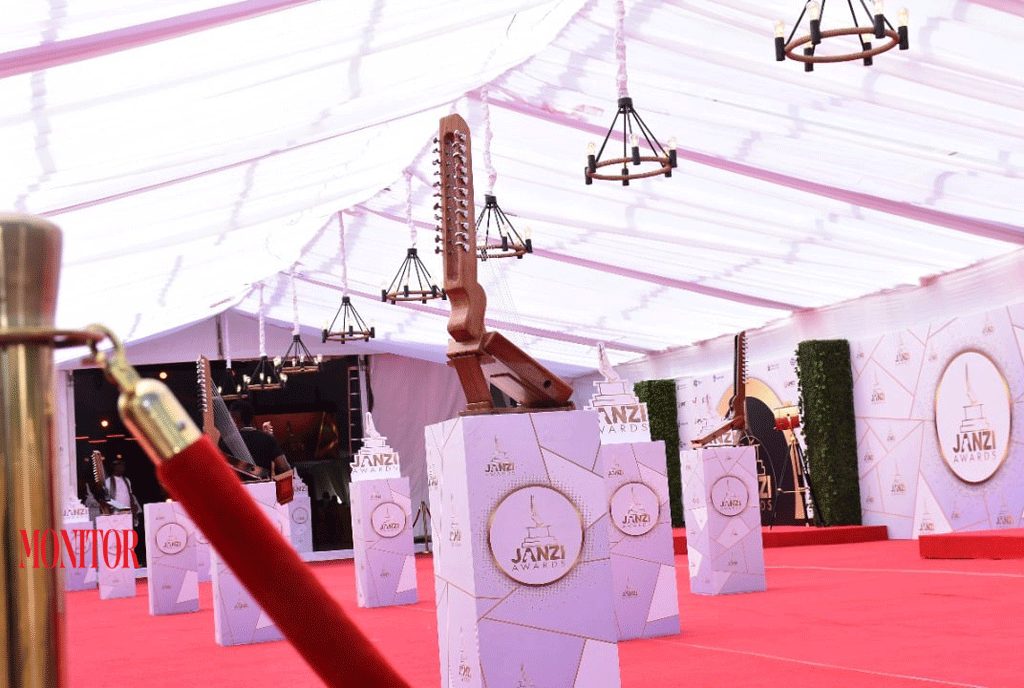Last Sunday was a “celebration” of the arts at the inaugural Janzi awards ceremony. The new award arrangement joins the queue of many other awards that have nearly faced similar challenges in the arts industry.
In the afternoon, this reporter attended the awards ceremony that happened at Kololo ceremonial grounds in Kampala.
The event was full of glamour and the arrangement would nearly appeal to artistes who turned up in numbers to be part of the ceremony that also attracted government officials.
However, behind the scenes, there was more to the awards than the flashy glamour that was televised on local televisions and digital streams.
Initially, one could assume that the drama would only stop at the blackout caused by the power generator failure, but it seemed like the beginning of the spectacle that unraveled at the event.
At backstage was artist Jenkins Mukasa struggling to plead with artistes who wanted to be paid before they arrive to perform at the venue, a situation that depicted mistrust between the artistes and the organizers.
“Nkubidde Pallaso agambye tusooka muweleeza sente ze” Mukasa complained saying (singer Pallaso had refused to turn up until his money was sent to his phone).
Moments later, a disgruntled mysterious artist unleashed a fight at the stage, claiming that Kadongo Kamu singer Gerald Kiweewa had refused to pay him his share from the money that Gen Salim Saleh gave artists in Gulu.
The situation was later calmed by the security personals that had been deployed in huge numbers.
However, a similar scenario resurfaced later in the night as “Journalists” ganged up against the one Bridget who was meant to distribute money to them.
It’s obvious that anyone would expect crystal clear performances at any music award ceremony but that wasn’t the case at the awards event that was organised by the splendid Fenon events.
The first creepy bit wasn’t allowing artists who are strangers to do live performances to dare live bands.
The seemingly improvised backline would simply shock artistes in the middle of the performance, sometimes increasing tempo or throwing around weird effects as the musicians performed.
For the bassist was doing his own thing and at the most moments, the electronic guitar would be felt more than another instrument.
These messed up performances like that of Fred Ssebata, A Pass, Feffe Bussi, and the damage was more audible at a time when upcoming musicians Liam Voice, Victor Ruz, and the An Known attempted to pull off a mash-up.
For Feffe Bussi whose Gulu mockery song would stand out, was instead let down by the sound and track that couldn’t rhyme to his pace.
The awards
The style of nominations could make anyone presume that the awards were entirely people’s choice. However, organisers claimed that there was an academy that would still contribute to the process.
This reporter was in this process where the public had to vote for films that haven’t been watched by the public and the owners eventually won. This was also the case with books in a society where few people read.
There was a mix-up in categories and no one would come out to explain the criteria that inspired several of the nomination blunders.
A record number of categories were given out and besides a few that came with a cheque from sponsors Stanbic Bank, winners were seen at backstage and in the main tent enjoying food, beers, and cocktail alongside their bulky plaques.
The audience wouldn’t hesitate to question why organisers had their projects and artistic outfits were nominated to compete with unsuspecting individuals.
Finally, it’s worthy to nominate people for their works but it was ridiculous to create a category for the Legends putting the dead to the pendulum alongside the living. Ideally, in normal circumstances, Moze radio’s family would have been invited to be honored and pick the award.
Not everything went wrong
The most humbling moment was when Afrigo Band’s Moses Matovu alias Papa Moi was honored for his contribution to the music industry. The overjoyed audience wowed him with applause as the legend took to the stage to accept the award.
In a similar manner, art revealed itself as vocalist Sandra Suubi turned out in an astonishing outfit created by artist Xenson Kafulu alias Samson Ssenkaaba.
Created with tyres and Lubugo (back-cloth) fabric, the outfit was a representation of Ugandan art in a fashion manner as she took to stage to sing the National anthem.
The décor, the fashion, the lighting, and the plaques were unique representations of the ceremony.
Janzi happened but what next?
Most Ugandan award ceremonies are still grappling with the issue of trust, transparency, and respect. Some have ended up exiting the market and others still struggle but no one cares.
The inconsistencies in the nominations and the awarding process at Janzi awards echoed similar fury that award arrangements face in Uganda. With a lot that needed to fix, it was yet another awarding mockery unleashed to the public.
gbuule@ug.nationmedia.com



























































